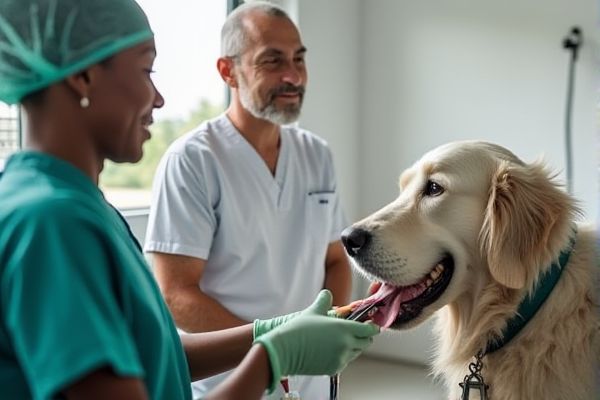
Zambia offers a variety of veterinary job opportunities across different sectors, including government, private practice, non-governmental organizations (NGOs), and research institutions. Graduates from veterinary schools can find positions in animal health services, wildlife conservation, and agricultural development, reflecting the country's diverse ecosystems and agricultural reliance. Experience in community outreach and public health initiatives is increasingly valuable, as veterinary professionals play a crucial role in disease control and food security. Networking through professional associations and engaging in continuing education can enhance career prospects and facilitate connections within the industry.
Job Description
Veterinary jobs in Zambia offer diverse opportunities for professionals dedicated to animal health and agriculture. Positions often involve providing medical care, conducting research, and improving livestock management practices to enhance food security. You may work in various settings, including private clinics, government agencies, and non-governmental organizations focused on animal welfare. The demand for skilled veterinarians is growing, making it an ideal time to consider a career in this field in Zambia.
Requirement
Veterinary jobs in Zambia typically require a degree in veterinary medicine from an accredited institution. You must be registered with the Veterinary Council of Zambia to practice legally. Practical experience through internships or volunteer work can enhance your qualifications and make you more competitive in the job market. Strong communication skills and a passion for animal welfare are highly valued by employers in the field.
Salary and Perks Expected
Veterinary jobs in Zambia offer competitive salaries, typically ranging from $15,000 to $30,000 annually, depending on experience and specialization. Various perks accompany these positions, such as professional development opportunities, health insurance, and sometimes housing allowances. The demand for veterinarians is growing due to an increase in livestock farming and wildlife conservation efforts in the country. You may also find that many employers value continuous education, which can enhance your expertise and career prospects in this field.
Similar Job Names
- Veterinarian
- Veterinary Technician
- Veterinary Nurse
- Animal Health Officer
- Veterinary Doctor
- Livestock Health Inspector
- Wildlife Veterinarian
- Veterinary Pathologist
- Animal Caretaker
- Veterinary Pharmacist
- Animal Nutritionist
- Veterinary Surgeon
- Research Veterinarian
- Veterinary Practice Manager
- Veterinary Epidemiologist
- Aquatic Veterinarian
- Veterinary Field Officer
- Laboratory Animal Technician
- Animal Welfare Officer
- Equine Veterinarian
Job Expectation Concept
Veterinary jobs in Zambia encompass a variety of roles essential for animal health and agricultural productivity. These positions often involve diagnosing and treating animal illnesses, promoting livestock welfare, and advising farmers on animal husbandry practices. Your responsibilities may include implementing vaccination programs and participating in disease control initiatives, contributing to food security in the region. Opportunities for specialization, such as in wildlife conservation or equine medicine, allow you to tailor your career to your interests while addressing the unique challenges of Zambia's diverse ecosystems.
Career Advantage and Weakness
Veterinary jobs in Zambia offer significant career advantages, including the growing demand for animal healthcare due to increasing agricultural activities and livestock farming. This sector presents opportunities for professional development and specialization in areas like veterinary surgery, animal reproduction, and disease management. However, challenges exist, such as limited access to advanced veterinary equipment and resources, which can hinder effective practice. Engaging with local communities and participating in outreach programs can enhance your impact and foster greater trust in veterinary services.
Important Thing Must Know
Veterinary jobs in Zambia are crucial for maintaining the health and welfare of livestock and companion animals. The demand for qualified veterinarians continues to grow due to the country's agricultural focus, where livestock farming plays a significant role in the economy. Your role as a veterinarian may involve not only treating animals but also educating farmers about animal husbandry and disease prevention. Opportunities can be found in clinics, farms, and governmental organizations, contributing to public health and food security. Keeping up-to-date with veterinary practices and local regulations is essential for success in the field.
Alternative Career Options
Exploring alternative career options in veterinary fields in Zambia opens up various possibilities, especially for those interested in animal welfare and public health. Opportunities exist in wildlife conservation, where you can work with organizations focusing on protecting indigenous species and their habitats. Agricultural extension services are another avenue, offering roles that involve advising farmers on best practices for livestock management and animal health. Pursuing education and outreach in veterinary-related programs can also lead to impactful careers in community health and sustainable farming initiatives.
Companies List
- Veterinary Council of Zambia
- Animal Health Zambia
- Zambeef Products PLC
- Zambia National Farmers Union
- National Parks and Wildlife
- Zambian Agricultural Research Institute
- Copperbelt Veterinary Services
- Veterinary Clinics in Lusaka
- Wildlife Conservation Society Zambia
- Ministry of Fisheries and Livestock
List of Ideal City
Zambia offers several cities that are ideal for pursuing veterinary jobs, providing a rich environment for animal health professionals. Lusaka, the capital, boasts numerous veterinary clinics, animal welfare organizations, and government departments focusing on livestock health. Kitwe, known for its mining industry, also has a demand for veterinary services to support local farms and animal care facilities. Living and working in these cities can provide valuable experiences and contribute significantly to the country's agricultural development.
 zambia-jobs.com
zambia-jobs.com